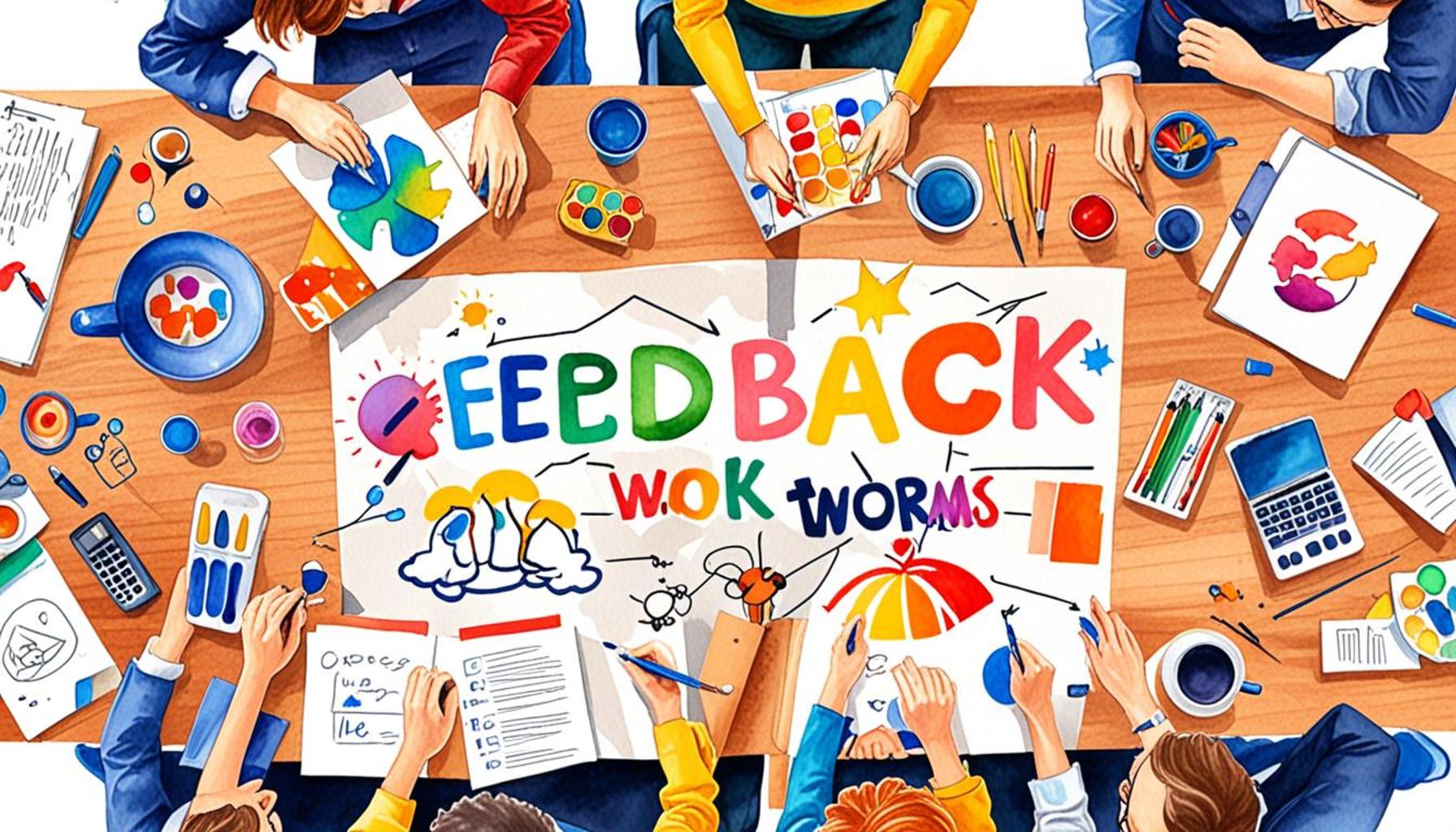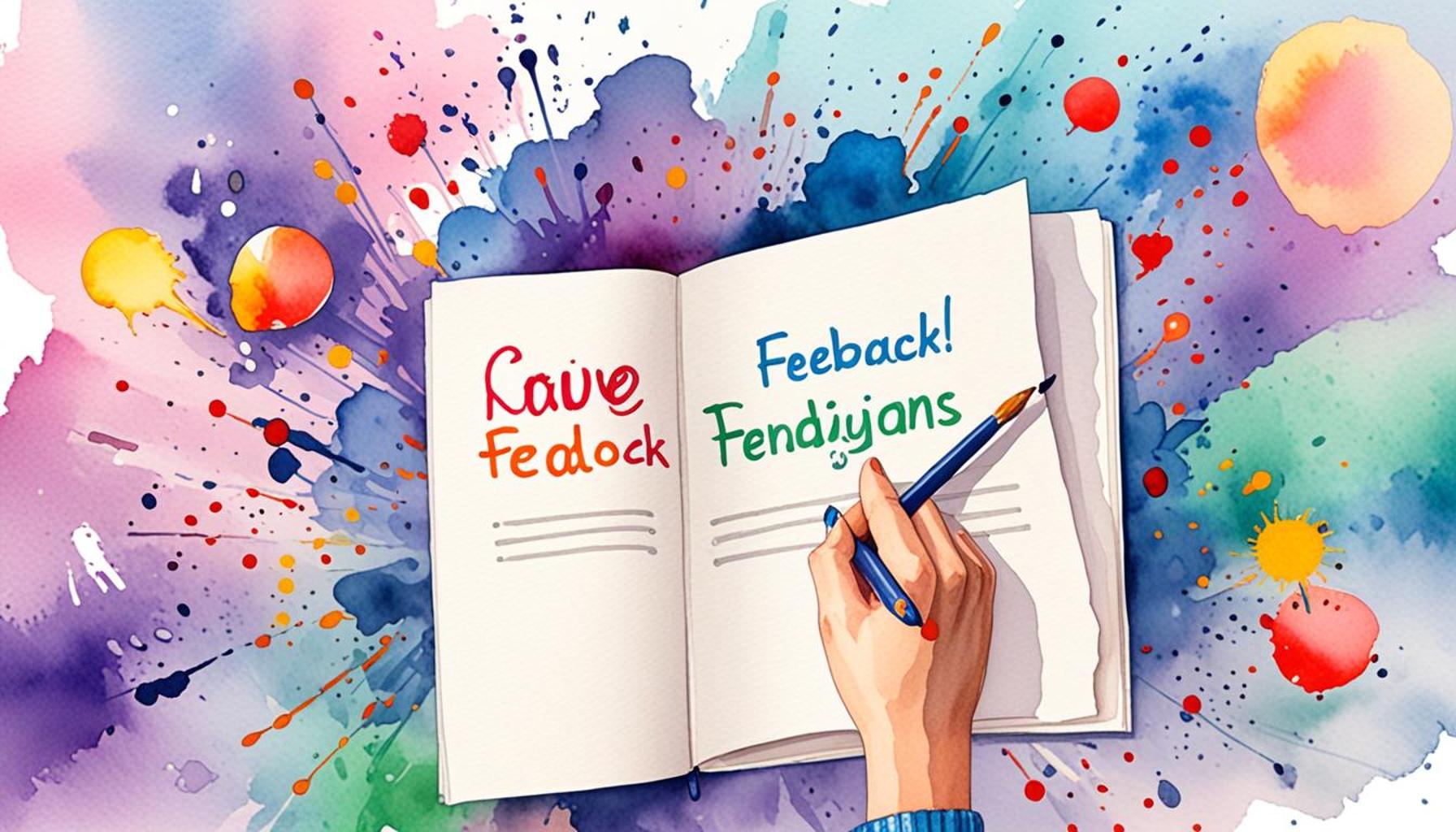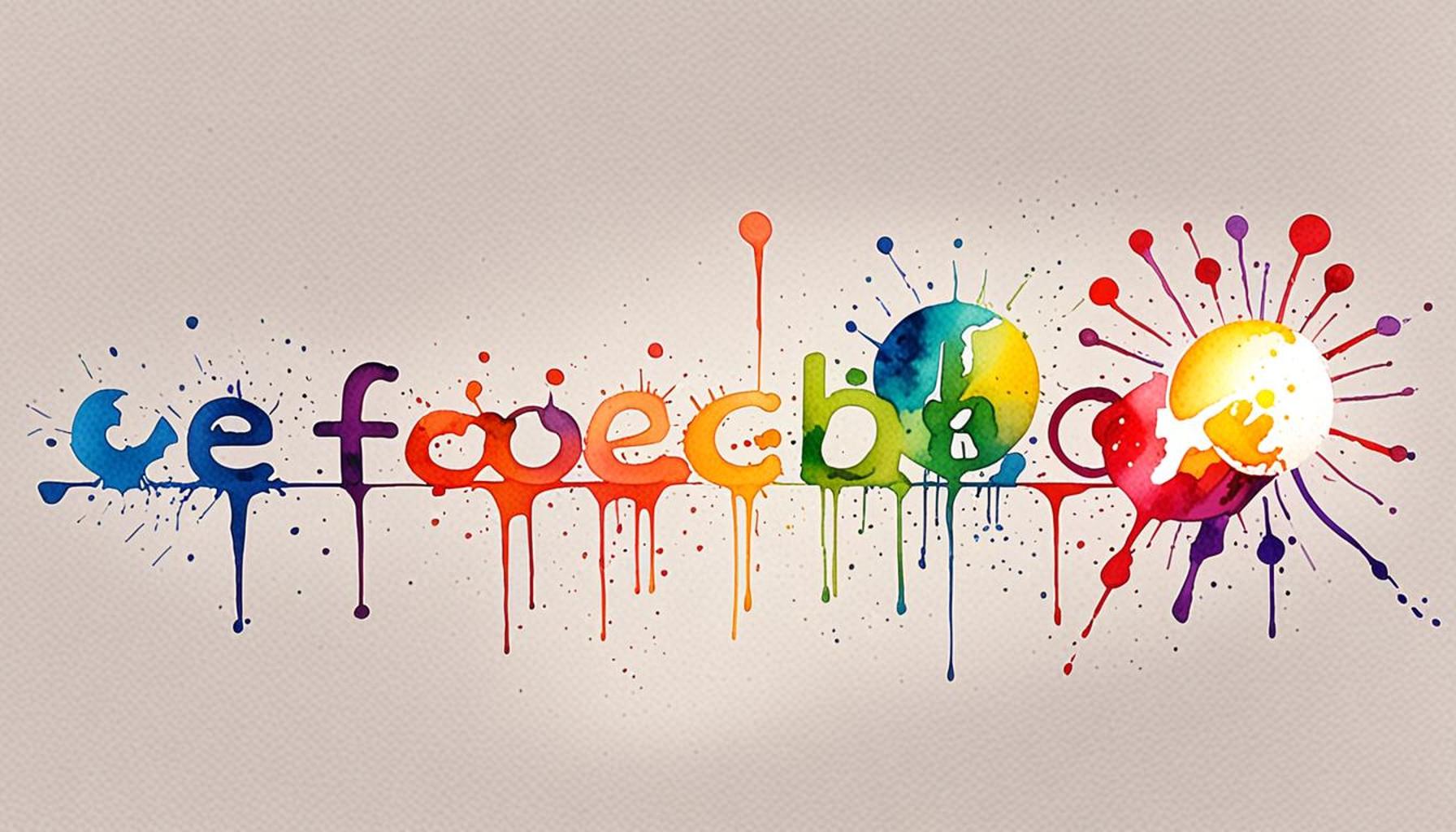Effective Strategies for Incorporating Feedback in Learning and Overcoming Challenges
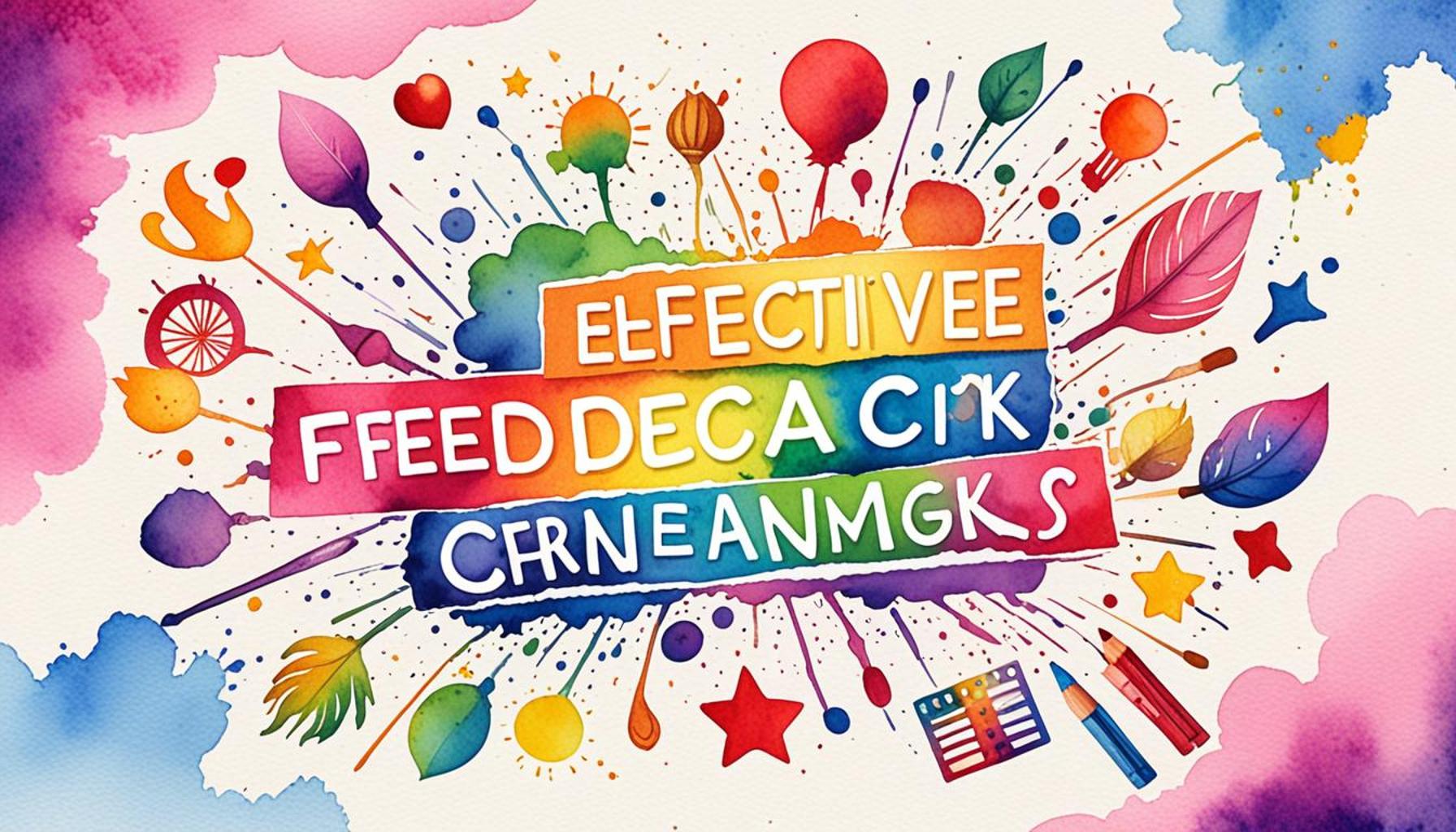
The Role of Feedback in Education
In the dynamic field of education, feedback is often heralded as one of the most effective strategies for enhancing learning outcomes. For both students and educators, feedback is not merely about correction; it is a valuable source of information that, when utilized correctly, can lead to improved performance and deeper understanding. However, the real question lies in how learners and teachers can effectively incorporate feedback into the educational process to capitalize on its benefits.
Creating a Feedback-Friendly Environment
One critical strategy in fostering effective feedback is to create a feedback-friendly environment. This means establishing a culture where open dialogue is encouraged. For instance, educators can hold regular sessions where students feel safe to express their thoughts about the lessons. When students are invited to share their insights and ask questions, it cultivates an atmosphere of trust and willingness to engage with the feedback provided. This method has been particularly effective in Nigerian classrooms, where collaborative learning often leads to increased motivation and knowledge retention.
Setting Clear Goals
Another crucial aspect involves the importance of setting clear goals. Feedback should always be aligned with well-defined learning objectives. For example, if the goal is to enhance writing skills, teachers can provide targeted feedback on specific aspects such as structure, grammar, or creativity. This tailored approach not only helps students understand what is expected of them but also enables them to internalize the feedback in a meaningful way. In Nigeria, this approach can counter the sometimes overwhelming nature of learning, providing structured paths to success.
The Power of Self-Reflection
Moreover, fostering a culture of self-reflection is essential. After receiving feedback, students should be encouraged to reflect on their experiences. Questions such as “What did I learn? What can I improve? How can I use this feedback for my next assignment?” can guide learners in understanding their progress and adapting their strategies accordingly. For example, students may keep a learning journal where they document feedback and their reflections, which can be a powerful tool for personal growth.
Challenges in the Nigerian Context
In Nigeria, the journey of embracing feedback is often met with challenges that can hinder educational progress. Students may encounter issues such as limited access to quality educational materials, which makes it difficult for them to fully utilize feedback. Additionally, poor learning infrastructure in some regions can affect the implementation of feedback practices. Cultural perceptions towards educational feedback may also play a role, where traditional views prioritize rote learning over interactive feedback mechanisms.
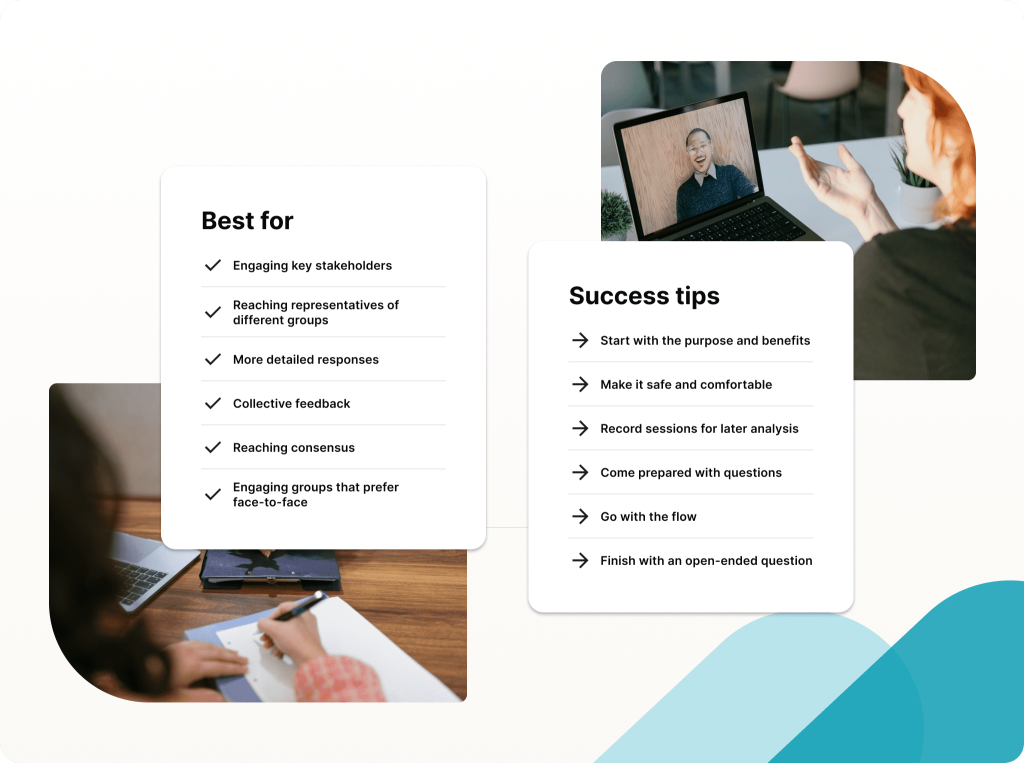
Empowering Through Strategies
It is crucial to address these challenges with effective strategies that enhance learning experiences. Initiatives like teacher training programs focusing on feedback methodologies, community engagement projects, and technology-integrated classrooms can empower both educators and students. By understanding how to effectively incorporate feedback, students can transform their challenges into stepping stones toward success, fostering a cycle of continuous improvement and personal growth in their educational journeys.
CHECK OUT: Click here to explore more
Strategies to Enhance Feedback Utilization in Learning
Incorporating feedback effectively is not merely about enhancing academic performance; it is a pivotal approach in nurturing lifelong learning skills and resilience in students. As educators strive to provide meaningful feedback, leveraging practical strategies becomes paramount. These strategies can lead to transformative experiences for learners, particularly in the Nigerian context, where unique challenges necessitate tailored solutions. Here, we explore several effective methods to integrate feedback into the educational journey.
Engaging in Peer Feedback
One of the most impactful strategies is the implementation of peer feedback. This approach encourages students to evaluate each other’s work, thereby enriching the learning experience. When learners engage in peer review, they not only gain exposure to different perspectives but also reinforce their understanding of the subject matter. In Nigerian classrooms, fostering a sense of camaraderie through peer assessments can enhance students’ confidence and communication skills, paving the way for a collaborative learning environment.
Utilizing Technology for Feedback
In today’s digitally driven world, technology plays a vital role in the feedback process. Various educational platforms and software can facilitate timely and constructive feedback, making it more accessible for students. For example, tools such as Google Classroom or educational apps provide instant feedback mechanisms that can inform students about their performance in real-time. By incorporating these technological solutions, Nigerian educators can bridge gaps in traditional feedback methods, thereby enhancing engagement and accountability among learners.
Incorporating Continuous Feedback Loops
Another essential strategy lies in establishing continuous feedback loops. Rather than restricting feedback to formal assessments, educators should provide ongoing feedback throughout the learning process. This could involve regular check-ins, informal discussions, and quick quizzes. By integrating regular feedback, students can quickly identify areas where they need improvement, allowing for immediate corrective measures. This iterative process helps combat learning challenges often faced in Nigerian schools, such as the lag in mastering concepts before moving forward.
Adopting a Growth Mindset
Promoting a growth mindset amongst students is fundamental in fostering resilience when receiving feedback. When students perceive feedback as a tool for improvement rather than criticism, they become more open to making necessary changes. Educators can encourage this mindset by highlighting success stories of individuals who have transformed challenges into achievements through constructive feedback. Providing students with examples of how influential figures in Nigeria overcame failures can serve as motivation and instill a sense of hope in their educational endeavors.
Conclusion: Embracing Feedback as a Tool for Success
Effectively incorporating feedback in learning is not simply an educational strategy but a foundational element that equips learners to navigate challenges. By employing methods such as peer feedback, leveraging technology, establishing continuous feedback loops, and cultivating a growth mindset, students can harness constructive criticism as a means for self-improvement. The journey may present hurdles, especially within the Nigerian education system, yet with determination and the right strategies, students can emerge empowered and ready to succeed.
| Category | Details |
|---|---|
| Continuous Improvement | Incorporating feedback promotes a cycle of continuous improvement in learning methodologies. |
| Enhanced Collaboration | Utilizing peer feedback enhances collaboration, fostering a supportive learning environment. |
| Personalized Learning | Feedback allows for tailored approaches to education, addressing individual learning challenges. |
| Resilience Building | Overcoming challenges through feedback cultivates resilience and adaptability in learners. |
Effective strategies for incorporating feedback in learning not only enrich the educational experience but also prepare learners to tackle various challenges. By fostering an environment of continuous improvement, students become more engaged and invested in their learning journeys. Furthermore, enhancing collaboration through peer feedback helps to break down barriers, encouraging open communication and sharing of insights. Tailoring feedback to meet individual learning needs allows educators to address specific challenges, providing meaningful support and guidance. Additionally, the process of receiving and acting on feedback builds resilience in learners, equipping them with the necessary skills to adapt in the face of adversity. This multifaceted approach to feedback ensures a comprehensive development framework, paving the way for both academic success and personal growth.
YOU MAY ALSO LIKE: Read read another article
Innovative Approaches to Feedback Integration
As the landscape of education continues to evolve, especially in Nigeria, there is an increasing need for innovative approaches to feedback integration. These approaches not only make learning more engaging but also address various challenges faced by students and educators alike. Below are strategies that can significantly enhance the effectiveness of feedback in learning environments.
Creating a Feedback Culture
Establishing a feedback culture is essential for fostering an environment where students feel safe to express themselves and learn from their mistakes. In Nigerian schools, where traditional teaching methods often dominate, encouraging open dialogue about feedback is crucial. Teachers should model how to give and receive feedback, reinforcing the idea that feedback is a shared learning opportunity rather than a hierarchical evaluation. This shift can be promoted through workshops, seminars, and class discussions centered around the value of collaborative growth.
Implementing Self-Assessment Strategies
Equipping students with self-assessment tools cultivates a sense of ownership over their learning journey. Nigerian educators can introduce reflective practices that encourage learners to evaluate their own progress and identify areas for improvement. For instance, students can maintain learning journals where they document their understanding of lessons, challenges faced, and steps taken to improve. By actively monitoring their own progress, students become more receptive to external feedback and can relate it to their self-assessments, fostering deeper connections with the material.
Offering Specific and Actionable Feedback
The efficacy of feedback often hinges on its specificity. Instead of general praise or vague criticisms, educators should strive to provide specific and actionable feedback. For example, rather than saying, “good job,” teachers might illustrate what was done well and suggest concrete ways to enhance the work. This type of detailed feedback not only clarifies expectations but also empowers students with a clear pathway for improvement. In contexts like Nigeria where educational resources may be limited, focusing on targeted feedback can help prioritize key learning objectives.
Incorporating Gamification Elements
With the rise of technology in education, gamification presents an exciting avenue for feedback incorporation. By introducing game-like elements to learning activities, educators can motivate students to engage with feedback more enthusiastically. For instance, setting up systems where students earn points or badges for utilizing feedback to improve their work can enhance motivation and foster a sense of achievement. This approach not only makes learning enjoyable but also encourages students to view feedback as an integral part of the learning process rather than a chore.
Encouraging Parental Involvement in Feedback
Finally, involving parents in the feedback process can pave the way for increased student accountability and support. In Nigerian households, where education is often considered a family priority, parents can play a vital role by discussing feedback with their children and encouraging them to take constructive actions. Schools can facilitate this by organizing workshops aimed at educating parents on effective ways to respond to their children’s feedback, enhancing the learning support system at home.
These innovative strategies for incorporating feedback in learning not only address classroom challenges but also empower students to embrace their educational experiences fully. By fostering an environment where feedback is viewed as a stepping stone to success, educators can help students develop the necessary skills to navigate their future, both academically and personally. The pathway may be challenging, but the potential for growth is boundless when students utilize feedback effectively.
LEARN MORE: This related article may interest you
Conclusion: The Power of Feedback in Educational Transformation
Incorporating feedback into the learning process is not merely a pedagogical strategy; it is a transformative approach that shapes the educational landscape, particularly in Nigeria. As we’ve explored, fostering a robust feedback culture, implementing self-assessment strategies, and fostering parental involvement are essential dimensions of learning. The significance of specific and actionable feedback cannot be overstated, as it enables students to identify clear pathways for improvement. Moreover, the integration of gamification elements introduces an element of enjoyment, transforming feedback from a daunting task into a motivating challenge.
To truly capitalize on the potential of feedback, educators must embrace innovative techniques that align with the diverse learning styles and needs of students. This commitment not only enhances academic performance but also encourages critical thinking and resilience. As students learn to engage constructively with feedback, they develop essential life skills that extend beyond the classroom setting.
Furthermore, overcoming challenges within Nigeria’s educational framework requires a collaborative approach, where teachers, parents, and the community take proactive roles in shaping a positive feedback ecosystem. By viewing feedback as a shared responsibility, we can cultivate environments where learners feel empowered to strive for excellence. The journey may be fraught with obstacles, but by implementing these effective strategies, we can shape a brighter future for the next generation of scholars. The potential for growth through feedback is immense and fosters a culture of lifelong learning that is crucial for personal and societal advancement.
